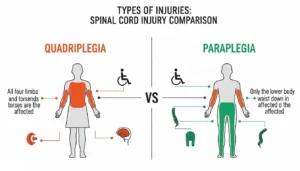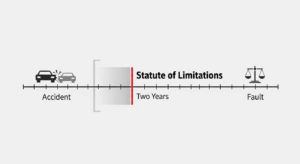
- Vaughn A. Wamsley
- Personal Injury
A spinal cord injury is one of the most severe and life-changing outcomes of a serious accident. In Indianapolis, victims of car crashes, motorcycle wrecks, or pedestrian collisions may suffer spinal trauma that leads to partial or complete paralysis. These injuries not only change the course of the victim’s life but also create enormous financial and emotional challenges for families. Understanding the medical realities, legal rights, and options for compensation is essential for anyone facing this devastating situation.
Understanding Spinal Cord Injuries
The spinal cord is the body’s main communication channel between the brain and the rest of the body. When it is damaged, the brain can no longer send or receive signals correctly, leading to loss of sensation or movement below the point of injury. The severity depends on where and how the injury occurred.
Types of Spinal Cord Injuries
- Complete Injuries: Total loss of function and sensation below the injury site. Victims experience paralysis on both sides of the body.
- Incomplete Injuries: Some movement or sensation remains. Outcomes vary widely depending on the location and extent of damage.
- Tetraplegia (Quadriplegia): Paralysis affecting all four limbs, typically caused by injuries to the cervical spine.
- Paraplegia: Paralysis of the lower body and legs, resulting from injuries to the thoracic or lumbar spine.
Regardless of classification, spinal cord injuries require long-term medical care, rehabilitation, and lifestyle adjustments that most victims cannot afford without significant compensation.
Common Causes of Spinal Cord Injuries in Indianapolis
Spinal injuries can happen in many ways, but certain types of accidents account for most cases in Indianapolis:
- Car Accidents: High-speed collisions and rollovers often result in severe spinal damage due to the force of impact.
- Motorcycle Accidents: Riders are particularly vulnerable to spinal trauma, especially in collisions with larger vehicles.
- Pedestrian and Bicycle Accidents: When pedestrians are struck by vehicles, the impact often affects the spine and head simultaneously.
- Falls: A slip, trip, or fall from height can cause vertebral fractures or dislocation that damage the spinal cord.
- Sports and Recreational Accidents: Although less common, contact sports and diving accidents can also result in catastrophic spinal injuries.
Each case is unique, and determining liability depends on identifying the negligent act or failure that led to the injury.
The Immediate and Long-Term Effects of Spinal Cord Injuries
The first days and weeks after a spinal cord injury are critical. Victims may require emergency surgery, mechanical ventilation, and extensive hospitalization. Once stabilized, they face an entirely new reality filled with medical challenges and emotional adjustments.
Short-Term Consequences
- Severe pain and loss of mobility
- Respiratory complications and risk of infection
- Loss of bladder or bowel control
- Swelling and inflammation of the spinal cord
- Hospital stays and multiple surgical procedures
Long-Term Consequences
- Permanent paralysis or partial mobility
- Muscle atrophy and chronic pain
- Depression, anxiety, and post-traumatic stress
- Need for continuous rehabilitation and physical therapy
- Dependence on mobility aids, caregivers, or home modifications
For many Indianapolis families, these effects translate into overwhelming financial strain and emotional exhaustion. A strong legal claim can help secure resources to manage these lifelong needs.
Legal Rights of Spinal Cord Injury Victims in Indiana
Victims of spinal cord injuries caused by another party’s negligence have the right to pursue compensation under Indiana personal injury law. To establish liability, the victim must prove:
- The defendant owed a duty of care (for example, to drive safely).
- That duty was breached through negligence or recklessness.
- The breach directly caused the accident and resulted injuries.
- The injuries led to measurable losses, both economic and non-economic.
Potentially liable parties may include negligent drivers, trucking companies, manufacturers of defective auto parts, or property owners who failed to maintain safe conditions.
Compensation Available for Spinal Cord Injury Victims
Catastrophic injuries like spinal cord damage often require millions of dollars in lifetime care. Compensation may include:
Economic Damages
- Hospitalization and emergency care
- Surgeries and ongoing rehabilitation
- In-home nursing or personal care services
- Lost income and future earning capacity
- Home and vehicle modifications
- Medical equipment such as wheelchairs or lifts
Non-Economic Damages
- Pain and suffering
- Emotional distress
- Loss of companionship or intimacy
- Loss of enjoyment of life
- Permanent disfigurement or disability
In some instances, involving gross negligence, punitive damages may also be available to punish the wrongdoer and deter future misconduct.
The Role of Expert Testimony
Because spinal cord injuries have lifelong implications, expert testimony is vital in establishing the actual cost of care. Vaughn A. Wamsley works with:
- Medical specialists who can explain the extent of the injury and future treatment needs.
- Life-care planners who calculate the cost of rehabilitation, equipment, and personal assistance.
- Economists who project lost income and future expenses.
These experts help ensure that settlements and verdicts accurately reflect the victim’s long-term financial and medical requirements.
Indiana’s Statute of Limitations and Comparative Fault Rules
Under Indiana law, spinal cord injury victims generally have two years from the date of the accident to file a lawsuit. Delays can lead to the loss of evidence or forfeiture of claims, so early legal action is crucial.
Indiana’s modified comparative fault rule allows victims to recover damages even if they are partially responsible for the accident, as long as they are less than 51% at fault. However, the recovery is reduced proportionally to their percentage of fault, making precise evidence of liability crucial.
Rebuilding Life After a Spinal Cord Injury
Recovering from a spinal injury is not just about medical care, it’s about regaining independence and adapting to a new way of living. With proper rehabilitation, many victims can achieve a degree of mobility and autonomy. This process often includes:
- Physical and occupational therapy
- Counseling and mental health support
- Adaptive technology for communication and movement
- Career re-training or disability support programs
Financial security plays a critical role in this recovery, and pursuing maximum compensation ensures that victims have access to these vital resources.
How Vaughn A. Wamsley Supports People Living with Paralysis in Indianapolis
Vaughn A. Wamsley has extensive experience representing clients in catastrophic injury cases, including spinal cord and paralysis claims. Our Indianapolis law practice focuses on comprehensive advocacy combining medical insight, legal strategy, and compassionate client care.
Our legal team investigates every aspect of the accident, works with leading experts, and negotiates aggressively with insurers to ensure fair compensation. If a settlement cannot cover the full extent of a client’s losses, Wamsley is prepared to take the case to trial to secure the results clients need.
Contact Vaughn A. Wamsley
A spinal cord injury can permanently alter your life, but you do not have to face the future alone. Vaughn A. Wamsley represents Indianapolis victims with professionalism, compassion, and proven legal skill.
If you or a loved one has suffered a spinal injury in a car, motorcycle, or pedestrian accident, contact Vaughn A. Wamsley today. You can reach us through ProtectYourRights.com or call our Indianapolis office today to schedule a free consultation. There are no fees unless you win compensation.



